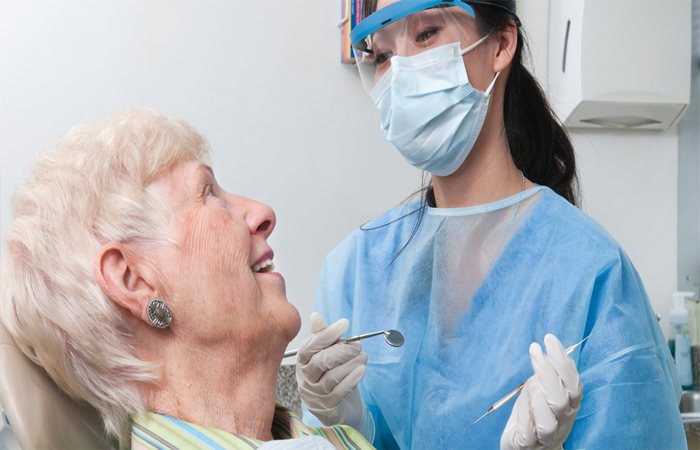While maintaining oral hygiene and taking care of your teeth is very important irrespective of the age, it is especially critical to ensure proper oral health in seniors as it is important for teens and adults since small dental issues can make way for serious problems.
Let us understand how dental health is affected with age and what you can do to prevent serious dental issues.
What happens to our teeth as we age?
Dry Mouth – Though seniors do not necessarily face the problem of dry mouth, they often experience it because of a chronic condition or regular medications. If you’ve been experiencing it lately, then you should consult your dentist for recommendations and appropriate treatment to prevent the problem.
Attrition – Wear and tear of tooth enamel are inevitable as we age because of years of chewing and grinding. And if the protective layer of teeth itself wears down, the risk of cavities increases slowly.
Gum Disease – Gum disease or periodontal disease is common in adults and teens, especially because it is a pain less condition until it is at an advanced stage. It occurs when bacteria in plaque stays accumulated on top of the teeth for a long period of time and it starts irritating the gums, making them swollen. If the condition is not diagnosed and treated properly at the initial stage, it leads to receding and bleeding gums as well as tooth loss.Therefore, proper dental care for seniors is very important to reduce the risk of gum disease.
Heart Disease – As per the American Academy of Periodontology, people who may be suffering from periodontal disease are twice as exposed to the risk of heart disease.
Recent Blog:- Is Liposuction a Good Way to Loose Belly Fat?
Root Decay – Seniors who begin showing the symptoms of gum disease due to poor oral health and care which can also suffer from root decay in later stages of gum disease. This is because receding gums can end up exposing the root of the teeth, which may wear down eventually and lead to the tooth loss.
Sensitivity – Tooth sensitivity is one of the most common problems that seniors face unlike adults and teens. As we age, tooth enamel wears down, exposing the dentin, which is sensitive to stimuli. This is the reason we experience sensitivity when consuming something too hot or too cold. Moreover, gums recede naturally with age, which exposes the part of the tooth not protected by enamel, for e.g., the areas that are too sensitive.
Cavity and tooth decay are also two of the leading reasons of sensitivity and gum diseases, which is why dental health for seniors should not be ignored.
Dental Care for Seniors – 3 Most Important Tips to Follow
- Eradicate problems that may lead to serious dental issues.
Many times, dental problems that may not be bothersome currently lead to serious dental issues in the later stage of life. For example, an incorrect bite may not irritate you now, but in the future, it can be the reason for bacterial accumulation and Gingivitis. Therefore, it is best to visit your dentist or orthodontist and undergo dental or orthodontic treatment, if needed.
- Follow a proper oral care routine.
Cleaning teeth properly is the key to good oral health for seniors, adults, as well as kids. Here’s an elderly dental care routine you must follow:
- Clean your teeth twice a day using a brush with soft bristles.
- Floss every day to get rid of minute food particles trapped between teeth.
- Rinse your mouth properly after every meal using a mouth wash containing fluoride.
- If you wear dentures, clean them on a daily basis but not with toothpaste as it is abrasive and creates microscopic scratches.
- Quit smoking to reduce the risk of gum disease.
- Visit your dentist regularly for oral checkups.
- Maintain a proper diet.
With age, teeth lose their strength. So, consume calcium rich foods to maintain their proper strength, such as cheese, yogurt, fat-free milk, tofu, soy drinks, dark green leafy vegetables, almonds, etc. Also, add few healthy items such as lean meat, fish, eggs, dairy, nuts, beans, etc. to your diet.
Here’s what you should avoid:
- Processed foods and beverages high in sugar
- Sticky and sweet foods that get trapped between teeth
- Bread
- Alcohol and any other food and beverage that causes the dry mouth
- Citrus fruits and any other items that erode the tooth enamel
- Potato chips
- Sticky dry fruits such as raisins, figs, apricots, prunes, dates, berries, etc.
Pro tip: Drink as much water as possible.
I hope these tips were helpful.
Take extra care of your teeth and visit your orthodontist regularly to make sure that you identify a problem as soon as it occurs.

